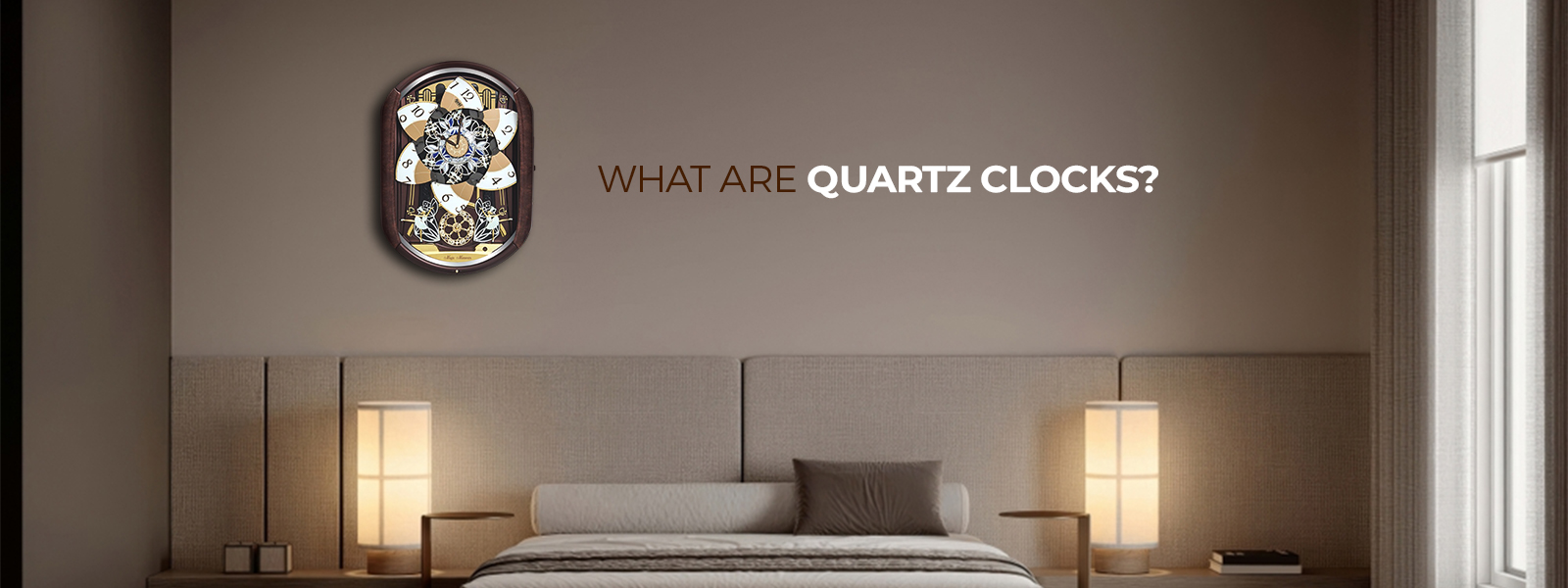
Quartz clocks are the timekeeping devices that are commonly used and are present in homes, offices, schools and public places. However, have you even reflected on what quartz clocks are and why they are commonly used in the modern environment? They dominate modern timekeeping? This guide will lead you through what quartz clocks are know their technology, benefits, and types of quartz clocks, including tips on choosing the right one for your use.
What are Quartz Clocks?
Quartz clocks are watches or timekeeping devices that work on the principle of an electronic oscillator controlled by a quartz crystal that helps to keep accurate time. A quartz is specifically cut and trimmed in a certain shape to oscillate at a certain frequency when electric current is passed through it. These dynamic oscillations are converted into small pulses that drive the clock to show time. A quartz clock is commonly preferred given their precise timekeeping and its need for low maintenance.
How Quartz Technology Works
In order to know what quartz clocks are, it’s necessary to understand a little bit of the science behind them. Quartz is a naturally occurring piezoelectric mineral that generates an electric charge when under mechanical stress and vibrates when exposed to an electric charge. A quartz clock has a small battery that feeds electricity into the quartz crystal making it vibrate at a constant rate of about 32,768 times per second. These oscillations are detected by an electronic circuit that converts them into a signal to turn the clock hands or update the digital display.
History of Quartz Clocks
The use of quartz for timekeeping or in watches was discovered in the 1920s but was mainly used in scientific projects. It was only in 1970 that it became a mass product with quartz clocks and watches becoming common in family homes and office spaces around the world. Today they are widely used as the most popular type of clock since they are cheap and accurate.
Benefits of Quartz Clocks
Quartz clocks are commonly used in homes and offices and come with following benefits
- High Accuracy – Quartz clocks lose merely a few seconds in a month.
- Low Maintenance – Requires no winding or manual action to keep running
- Cost-Effective – Affordable and cost-effective time keeping device
- Variety – Available in analog, digital, and hybrid.Durability – Quartz clocks last for a longer period of time given they have fewer moving parts, resulting in less wear and tear with time.
Various Types of Quartz Clock
There are mainly 2 types of Quartz Clocks
Analog Quartz Clocks
Analog clocks possess hands representing hours, minutes and seconds and operate on quartz movement principle rather than a mechanical spring.
Digital Quartz Clocks
Such clocks show time in digital form with other features such as alarms, calendars, and thermometer readings.
Selecting the Proper Quartz Clock
In selecting a quartz clock, think about the following:
- Purpose – Assess whether you need a clock for aesthetics, accurate time-keeping, or both.
- Style – Select classic or modern style to go with the interior.
- Display Type – Opt for analog clock if you like the vintage look. If readability features and functionalities matter, opt for a digital clock
- Other Features – Alarms, backlight, temperature display, or radio-controlled timing.
- Brand Reliability – Choose popular brands like Orpat for reliability and hassle-free operation.
Maintenance of Your Quartz Clock
- Quartz clocks are hassle-free, but taking care of them does not hurt:
- Change batteries in a timely manner when the clock starts slowing down or stopping.
- Gently clean the clock face and hands with a soft cloth to prevent dust accumulation.
- Avoid extreme temperatures and humidity to ensure movement is safe.
Why Choose Orpat Quartz Clocks
Orpat’s quartz clock offers style, reliability, and affordability. Famed for precision-built construction, Orpat produces wall, table-top, and specialty quartz clocks that fit any home or office setting. Built to provide years of use with minimal maintenance, these clocks are ideal for general timekeeping.
We have a clear answer to what are quartz clocks and why they remain one of the most reliable and economical timekeeping options in the market today. If you prefer the ease of use of a slimmed-down digital face or the elegance of an analog clock face, Orpat’s variety of quartz clocks offers accuracy, design, and quality that you can trust for years to come.
Frequently Asked Questions
what are quartz clocks, These are clocks consisting of a quartz crystal and an electronic circuit which maintains precise time through a miniature battery in most cases.
Yes. Quartz clocks are more precise, losing only a few seconds within a month while mechanical clocks lose a few minutes.
With proper care, a quartz clock can last for decades, usually needing only occasional battery replacement.
No, quartz clocks are powered by batteries and need not be wound by hand as mechanical clocks do.
In most common cases, a simple battery change or cleaning will put the clock in working order, but where more serious problems exist, the internal movement must be replaced.


